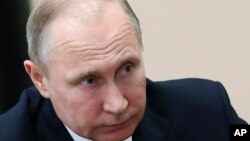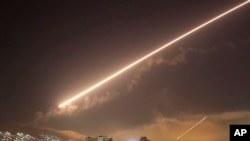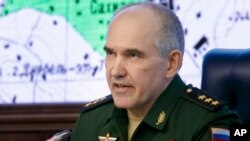Russian President Vladimir Putin condemned U.S. coalition airstrikes in Syria as a violation of international law.
In a statement posted to the Kremlin website, Putin called the coalition airstrikes an "act of aggression against a sovereign government" and accused the United States of compounding the humanitarian catastrophe in war-torn Syria.
Putin called for emergency meeting of the U.N. Security Council to discuss the attack.
"The current escalation of the situation around Syria has a devastating impact on the whole system of international relations," Putin said.
"History will put everything in its place, and it has already laid heavy responsibility on Washington for bloody reprisals against Yugoslavia, Iraq and Libya."
What chemicals?
Putin said Russia's own military experts had traveled to the site of the alleged chemical attack in Douma and found no indication of chlorine or other toxic gases.
"Not even one local resident confirmed the fact of the chemical attack," said Putin.
The Russian leader also complained that the United States and its allies had "cynically" failed to wait for an assessment by inspectors from the Organization for the Prohibition of Chemical Weapons - currently on the ground in Syria.
Russia has long maintained that all chemical weapons stores held by its ally, Syrian leader Bashar al-Assad were given up under a 2013 deal the Kremlin brokered with the Obama Administration.
Any remaining banned weapons in Syria, the Kremlin argues, are in the hands of either terrorists or Western-backed rebel groups, who deploy chemical weapons to undermine the Assad government.
Russian officials have repeatedly suggested that the aim of the latest U.S.-led airstrikes was to prevent the OPCW from carrying out its work.
Military matters
Meanwhile, Russia's Defense Ministry confirmed that the U.S.-led airstrikes had avoided hitting Russian bases in the Syrian cities of Tartus and Hmeimim and that Russian air defenses had not been deployed.
Indeed, Russian newswires reported that Syria's government had largely fended off the airstrikes using Soviet-built air defenses that were nearly 30 years old.
Still, Defense Ministry officials accused Washington of striking "both military and civilian infrastructure" and suggested Moscow may help Damascus beef up its air defenses.
In a hastily arranged news conference Saturday, Colonel-General Sergei Rudskoi said Russia was weighing deliveries of its S-300 surface-to-air missile systems to Syria and "other countries" in lieu of the attack.
Diplomacy back-channels
Despite the hostile rhetoric, there were signs of back-channel diplomacy as well.
In a video issued by the U.S. Embassy in Moscow, Ambassador John Huntsman said the United States had communicated with Russia "to reduce the danger of any Russian or civilian casualties."
"This is not about a conflict between superpowers," said Huntsman, "but about the principle that the use of chemical weapons is simply unacceptable."
"We would still welcome cooperation with a Russia that will do the right thing."













